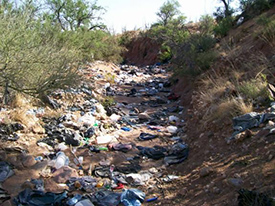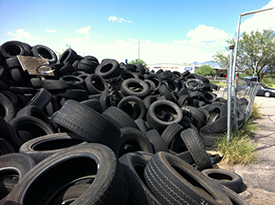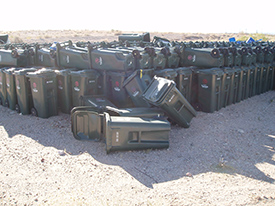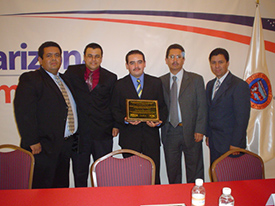
Trash left behind along the U.S.-Mexico border |
Arizona Border Trash
The environmental impact caused by illegal immigration and the trash left behind, is increasingly found in more remote and fragile areas. It has been estimated that over 2,000 tons of trash are discarded annually in Arizona's borderlands. Many federal and state government entities, Native American tribes, and private landowners are affected by the problem, and dealing with it requires extensive coordination.
Successful cleanups of border trash sites have been done by government, private landowners, and volunteer groups for several years. But there was no consistent method for conducting cleanups or collecting data. ADEQ collaborated with other agencies to create the Arizona Border Trash web site. This is where people conducting cleanups can find assessment and cleanup resources, and where data from cleanups can be consistently tracked.
Supporting Waste Management in the Border Region
Waste related activities carried out by OBEP staff in the border region are in support of the ADEQ Waste Programs Division. These actions include: assisting with voluntary pollution prevention activities, promoting an increase in waste tire collection sites, and encouraging electronic waste recycling.
More information about ADEQ's solid waste management section.

ADEQ's OBEP helps reduce the amount
of used tires in the border region. |
Waste Tire Collection Sites
OBEP assists with ADEQ's effort to update its waste tire collection sites inventory in the Arizona border region. The goal is to increase the number of waste tire collection sites registered with ADEQ which the sites are required to do. During site visits, staff provide brochures that explain the regulatory aspects of storing used tires outdoors. They also have information about the location and proper use of fire extinguishers, as well as emergency access and escape routes. Many of these tire shops established best management practices to reduce the number of tires stored outdoors, based on acceptable methods of waste tire disposal.
There are countless information sources on the topic of waste tires. The following links provide access to some of those sources:

End-of-service trash bins waiting to be recycled. |
Re-Use of Trash and Recycling Bins
OBEP serves as a liaison between Tucson Clean & Beautiful, the City of Tucson, and border communities for the donation of surplus and end-of-service trash and recycling bins. Since 2005, this effort has resulted in the donation of more than 6,000 bins. For additional information please visit:
Tools to Help Arizona Border Communities Reclaim Resources
Illegal dumping of electronics has led to a state-wide effort to collect e-waste by encouraging communities to recycle responsibly. OBEP assists this by developing bi-national partnership alliances, establishing contact with key stakeholders, and identifying recyclers that may be interested in learning more about e-waste recycling certification programs.
According to the EPA, toxic chemicals in electronics can seep into the land over time be released in the atmosphere. This impacts communities and the environment.
More information about recycling can be found at the following links:
Past Accomplishments

Members of the Arizona-Mexico
Green Organization |
Arizona-Mexico International Green Organization (AMIGO)
The Arizona-Mexico International Green Organization (AMIGO), a bi-national partnership promoting pollution prevention, was sponsored by ADEQ for nearly 10 years. It created partnerships that lead to voluntary pollution prevention activities among industries in the Arizona-Sonora region. It was meant to bring industries in Arizona and Sonora together to share information and technologies about reducing waste and pollution while increasing profits, worker safety, and environmental health.
The program was created in collaboration with state and federal officials in Mexico. Initially there was little interaction with representatives from the maquiladora or twin-plant industry located across the border from Arizona. Maquiladoras are manufacturing or assembly plants in Mexico with goods and equipment staying in the country temporarily.
In addition to tax incentives by participating in the maquiladora program, companies are required to return goods and wastes they generate to the country of origin of the raw materials. Therefore, hazardous wastes generated by maquiladoras across the border from Arizona are transported to treatment or disposal facilities in the U.S.
Through AMIGO, maquiladoras in Sonora and companies in Arizona participated in voluntary workshops and site visits to exchange ideas and assist one another in reducing waste. Representatives from participating maquiladoras began a non-profit organization called the Association of Environmental Safety Professionals of Sonora. This organization provides a sustainable manner in which peer-to-peer collaboration on environmental issues continues.
AMIGO Environmental Annual Award
http://www.azdeq.gov/function/help/glossary.html#profepa: ADEQ, the U.S. Environmental Protection Agency (EPA), the State of Sonora Ecology and Sustainable Development Commission (CEDES), and the Sonora Delegation of Mexico's Federal Attorney General for the Environment (PROFEPA). The awards were presented by the governors of Arizona and Sonora during the annual Arizona-Mexico Commission (AMC) Fall meeting. The last AMIGO Award was presented to the maquiladora MTD Southwest Inc. in 2011.
AMIGO Related Accomplishments
Companies such as Bose, Motorola, Master Lock, Chamberlain, Becton-Dickinson, Alcatel-Lucent, and the Association of Environmental Professionals of Sonora, have led efforts to promote pollution prevention, both within their industrial processes and in their communities. Some accomplishments by individual industries include pollution prevention seminars and environmental management systems, training for over 3,500 employees, reducing the generation of paint waste by up to 1,700 gallons a year, eliminating lead emissions by replacing lead solder with an aqueous-based solder solution, and reducing the annual amount of waste sent to the landfill by 7,300 pounds.
In a demonstration of reducing wastes while creating a beneficial outcome, several of these companies partnered with their city government (Nogales, Sonora, Mexico), academic institutions, and community volunteers to construct a fibercrete home. On October 17, 2008 a dedication ceremony was held to present the first fibercrete home in Nogales to its new owners, a single mother and her three children. Fibercrete, also known as papercrete, is an environmentally friendly construction material which, compared to a standard cinder block, contains a small amount of cement and sand. The major component for papercrete blocks is paper pulp. This project reduced the amount of paper and cardboard waste going to the landfill by eight tons. Participants estimated that they saved 100 trees in the construction process, which can eliminate 1,200 lbs. of carbon dioxide and generate 1,800 lbs. of oxygen annually. For more on this type of activity, visit:
Back to the OBEP Main Page
|